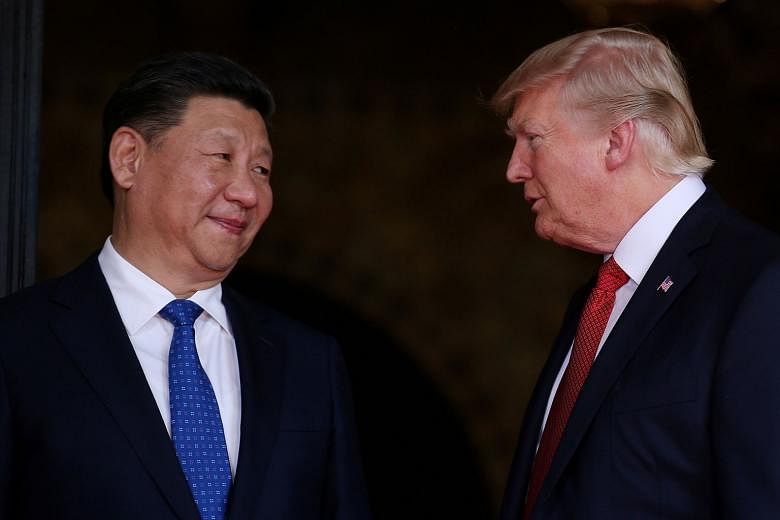BEIJING (CHINA DAILY/ASIA NEWS NETWORK) - United States President Donald Trump stated in his keynote address at the closing session of the 2018 World Economic Forum in Davos, Switzerland, in January that his "America First" strategy did not mean "America Alone".
Yet despite this, just four days later in his State of the Union address on January 30, he repeated his customary nationalistic and isolationist stance and the United States' zero-sum mentality, reiterating the message of both the National Security Strategy issued in December and the National Defense Strategy issued by the Pentagon in January, saying rivals like China and Russia challenge the US' interests and economy.
When he talked about rebuilding American infrastructure, he precluded any outside involvement, asserting "we will do it with American heart, American hands, and American grit".
He stated his own presidency is the "new American moment", claiming: "There has never been a better time to start living the American Dream."
"If you work hard, if you believe in yourself, if you believe in America", then, "together, we can achieve anything", he declared. And he sought to rally Americans as one team, one people, one American family, claiming: "We all share the same home, the same heart, the same destiny, and the same great American flag"; and this oneness and sameness can be cemented in "rediscovering the American way" guided by "in God we trust".
While the "America First" doctrine has been part of the US political rhetoric for almost 80 years since the America First Committee was founded in 1940, it has never been instrumental in making America great, let alone being able to make America great again.
The reason is that "America Alone" and an isolationist strategy and mentality usually accompanies the "America First" doctrine.
Trump's speech reminds me of Chinese President Xi Jinping's political remarks when he took office as Chinese president in 2013. When Xi became president of China, he first articulated the Chinese Dream for a well-off society and a strong Chinese nation-state and proposed the Belt and Road Initiative to the world as a collaborative project for win-win results.
He then called for self-confidence in China's political system and culture and championed the creative revival of traditional Chinese culture as well as the integration of the revolutionary legacy and socialist thought and traditional Chinese culture with Western science and technology. In his report to the 19th National Congress of the Communist Party of China in October, he formally outlined the course for China's development over the next 35 years.
By 2035, the end of 16th Five-Year Plan (2031-35), China is expected to have realised basic modernisation.
By 2050, China is expected to have achieved comprehensive modernisation and realised its rejuvenation.
In the meantime, Xi has had the Belt and Road Initiative and presented his vision of a community of shared future for humankind. All these and more constitute some core elements of Xi Jinping thought.
Both Trump and Xi have attempted to demarcate and brand a new era of politics for their countries and the world.
The Trump doctrine, outlined in his State of the Union Address, appears to mimic Xi's rhetorical structure and strategic thinking.
Xi first articulated the Chinese Dream then proposed the four self-confidences (self-confidence in the socialist institutions, road, theory, and culture), and then proposed the Belt and Road Initiative to build infrastructure as a major instrument for globalisation around the world.
Like Xi, Trump used the "dream" as a rallying call to the people, appealed to the self-confidence of his constituents and their confidence in the American Way, their oneness and sameness.
Furthermore, Trump recalled the once "successful" American Way of the old days to consolidate a shared single American destiny, and chart the future for all Americans.
However, there are some fundamental differences between the two. First of all, while Trump embraces protectionism, Xi champions two-way neo-globalisation. Second, while Trump celebrates nationalism, Xi celebrates a hybrid of nationalism and cosmopolitanism.
Third, in international politics, while Trump celebrates realism and bilateralism, Xi believes in idealism and multilateralism.
Fourth, in terms of security, while Trump believes in a zero-sum concept of security, Xi believes in positive-sum and common security.
In terms of culture, while Trump believes in one size-fit all monotheistic, Anglo-Saxon and Judeo-Christian culture of white male dominance, Xi believes in atheistic, universalistic multiculturalism or neoglobalisation.
Last but most important, while Trump believes in creating or reconstructing the American community of a shared destiny, Xi is most interested in contributing to the creation of a community of shared future for humankind in which both China and the US can be made great again.
So in a way, President Trump can be styled as a US national head of state trying to maintain the American status quo, but Xi is increasingly seen as a Chinese global leader attempting to modernize China and transform the world for more peace and prosperity for all.
While Trump's doctrine is seen as being both less and less American and less and less global, Xi's thought appears to be seen not only as being more and more Chinese, but also more and more global.
Therefore, to deal with China headed by Xi Jinping as a rival of the US seems to be quixotic at best. To isolate or contain China would be not only futile, but also self-damaging.
In conclusion, cooperation is the only means for both the US and China to make America and China great again respectively, resulting in making humanity great again.
The author is a professor at the School of Communication, Chapman University and a research fellow at the National Academy for Development and Strategy, Renmin University of China. He writes regularly for China Daily, a member of The Straits Times media partner Asia News Network, an alliance of 23 news media.

